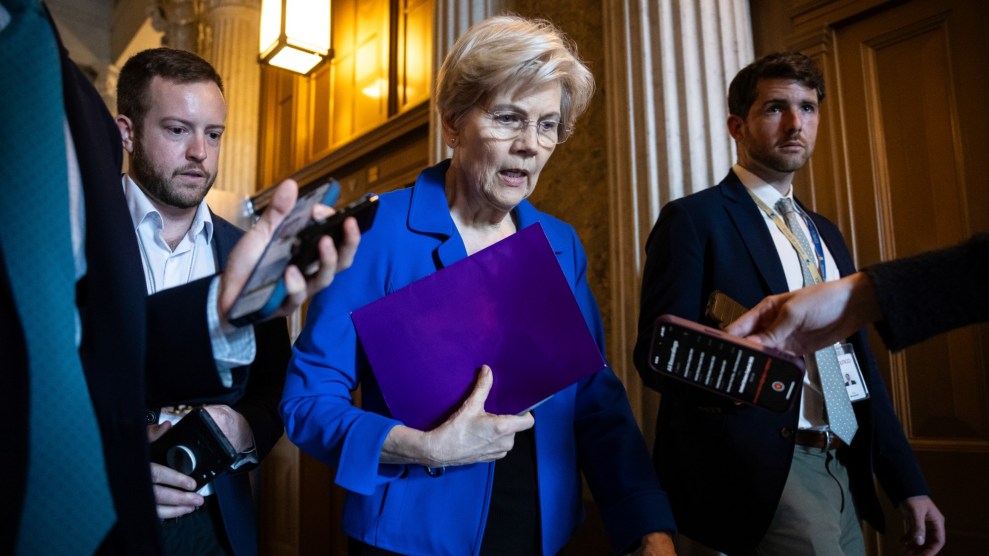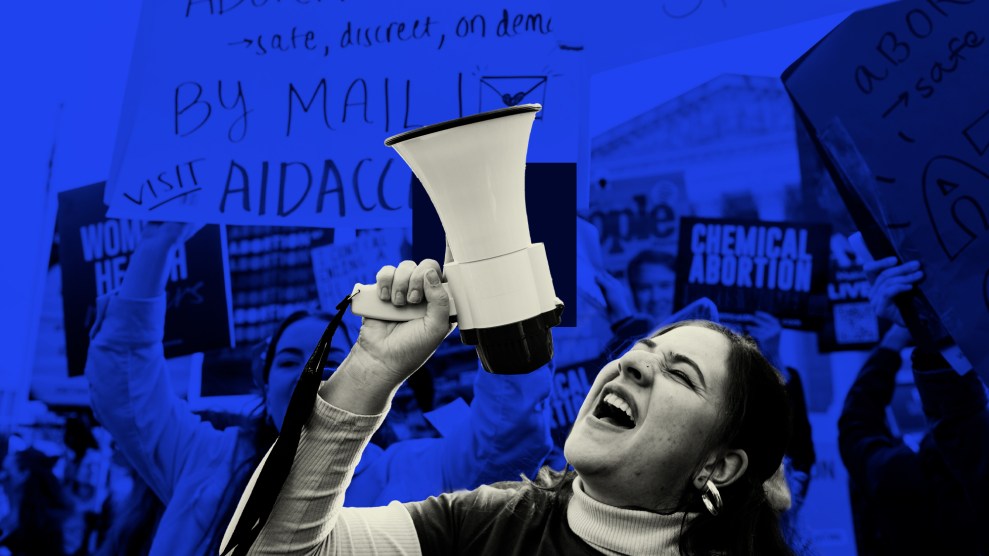The long-running struggle between Robert Mugabe’s repressive government and Zimbabwe’s last remaining independent paper, the Daily News, took a couple of fresh turns in the past week.
On Friday Zimbabwe’s Administrative Court ruled that the paper, shut down by Mugabe six weeks ago on the grounds that it was publishing illegally, could go ahead and apply for an operating permit. The News, without waiting for its license, triumphantly rolled the presses, running the headline “We’re back!” — only for the police to shut it down again, arresting 18 staffers, including the paper’s chief executive and three directors.
(Daily News founding editor Geoff Nyarota was featured as a Mother Jones “Hellraiser” in 2002.)
Friday’s court ruling looked like an unaccustomed victory for press freedom against Mugabe’s autocratic rule. Zimbabwe’s National Editor’s Forum was jubilant:
“‘The judgement strikes a blow for Press freedom while at the same time repudiating the pretensions of the Media and Information Commission. The whole rotten apparatus…is now increasingly seen, to use the Minister of Information’s own words on another matter, as ‘little lower than toilet paper, forever a nullity that invites ridicule in any decent court of law.'”
And Zimbabwe’s Movement for Democratic Change hailed the court decision as “a positive indicator that despite all the madness in the country, there are still some men and women of integrity who are willing to drive Zimbabwe back to its prime spot as the beacon of Africa.”
The tone was quite different a few days later. Reporters Without Borders, the media advocacy group slammed the police action:
“We are outraged by these arrests, which show the Zimbabwean authorities will stop at nothing to prevent the country’s sole independent daily from publishing. They must halt this series of arbitrary arrests and this unacceptable harassment of the newspaper’s directors and employees.”
Under Zimbabwe’s repressive Access to Information and Protection of Privacy Act (AIPPA), passed in 2002, all publications and journalists must be licensed, which is to say approved, by the government. The Daily News‘s parent company, the Associated Newspapers of Zimbabwe (ANZ), initially refused to file for the permit on the grounds that it was unconstitutional. After a Supreme Court decision requiring ANZ to file for the license, the state’s Media and Information Commission (MIC) subsequently denied the paper registration because it had operated without the license, and therefore illegally, for eight months.
Last week’s trial in the Administrative Court was ANZ’s appeal against MIC’s refusal to register the News and its sister paper, the Sunday News. The court unanimously ruled to require MIC to grant the Daily News a license by Nov. 31. For a review of the ruling and a chronology of ANZ’s situation since September, see the Media Institute of Southern Africa’s (MISA) detailed report.
Police charged directors with “operating an ‘illegal company,'” according to the Independent. With the directors imprisoned and the Daily News‘ fate uncertain, the story has now all but vanished from the U.S. press.
Channel News Asia, on Wednesday, reported that the directors have been freed on bail after much “legal wrangling”. Ignoring the defense’s request to drop all charges, the four will return to court Nov. 13 to be tried for acting “in contempt when they proceeded to publish Saturday against an earlier Supreme Court ruling that they should first get registered.” Herein lies the confusion: Daily News supporters insist that Friday’s victory allows the paper to begin publishing immediately, as if it had the license, while the Supreme Court insists on prior registration.
While the legal details will have to be determined in court, many international media organizations have issued firm statements regarding police treatment of those involved with the Daily News. The International Federation of Journalists emphasized the importance of the Daily News‘s struggle for Africa’s media:
“The International Federation of Journalists today called for a worldwide campaign among journalists’ groups to defend the Daily News in Zimbabwe after a weekend in which police closed down the independent daily for a second time and the paper’s director was arrested at his home.
‘This is Africa’s biggest press freedom battle,’ said Aidan White, IFJ General Secretary. ‘Journalists all around the world are outraged at the tactics of the Mugabe regime which are in defiance of the courts and international standards of human rights.'”
The World Association of Newspapers and the World Editors Forum, in a “Letter to His Excellency President Robert Mugabe” warn the Zimbabwean leader that he’s violating international law:
“We respectfully remind you that the prosecution of journalists for failing to hold the correct government accreditation constitutes a clear breach of their right to freedom of expression, which is guaranteed by numerous international agreements, including the Universal Declaration of Human Rights. Article 19 of the Declaration states: ‘Everyone has the right to freedom of opinion and expression; this right includes the freedom to hold opinions without interference and to seek, receive and impart information and ideas through any media, regardless of frontiers.'”
Beyond simply expressing concern, an editorial in the Times of Zambia suggested that Zimbabwe’s trade partners, like the South African Development Community must get involved in order to encourage the government to treat media differently. Without external pressure, “old brother Bob” will not have any reason to respect press freedom.
In a novel interpretation of recent events, the Korea Herald predicts this most recent abuse may be the “last straw” for Mugabe’s regime:
“The solidarity among African leaders that has sustained Robert Mugabe’s brutal regime in Zimbabwe may be on the verge of disintegrating and his decision to shut down Zimbabwe’s only independent newspaper, the Daily News, could prove to be crucial in weakening the support that he still enjoys in the region.”
As evidence for Mugabe’s falling stock, the Herald cites Mugabe’s having been snubbed, in part because of the News flap, by the meeting of the Commonwealth Heads of Government, to take place take place in Nigeria in December.
If we’ve learned anything about Mugabe in the past few years it’s that he isn’t notably sensitive to regional and international disapproval. But thanks to the courage of the Daily News journalists, the issue isn’t going to go away.















